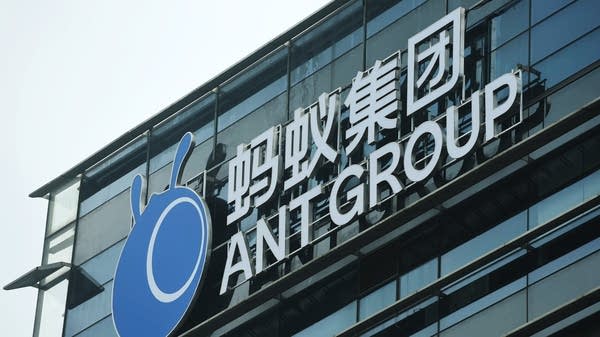This week, the Chinese government forced the company under the control of its central bank.

The Chinese company Ant Group does a lot of things. It provides loans, mobile payments through Alipay, credit scores, and it acts as an investment platform. Last year, it was headed for what might have been the biggest initial public offering in history, until the Chinese government abruptly canceled it. The government on Monday forced the company under the control of its central bank and demanded that it restructure as a financial holding company.
All this happened after founder and tech billionaire Jack Ma gave a speech critical of Chinese regulators last year. But the obvious story is not the whole story. I spoke with Rui Ma, who hosts the Tech Buzz China podcast and advises investors about Chinese companies and technology. She says China has had major fintech scandals, and regulation was inevitable either way. The following is an edited transcript of our conversation.

Rui Ma: Regulators have been trying to rein in systemic risk for a long time, especially in the wake of the recent peer-to-peer fiasco, where ordinary citizens lost something like over $100 billion, that there is now this urgency to make sure that future fiascos and scandals like that don’t occur. I think, and also because of [Ant’s] scale, and because of the amount of credit that it was pulsing through the system, and the potential for it to pose systemic risk, I think that led regulators to act maybe faster than we would have expected. Ant’s financial businesses are very clearly now under the role of the banking regulators, whereas before, that was actually not as clear.
Molly Wood: Is this an example of at least in China — well, everywhere — fintech is proving very disruptive. And do you think that, actually, these moves by the Chinese government might be repeated in other countries who say, “Yeah, this is emerging technology and business models that are risky”?
Ma: My impression is that there are other countries. For example, I talked to some Indian entrepreneurs in fintech, and their reaction was that “this would never occur in India, because our government actually has stricter regulations in place.” So I think in a lot of emerging countries, I think it’s going to look a lot more like China, where especially technology-enabled financial startups are going to be proving very, very disruptive, and governments are going to have to think hard about what they want as outcomes in their country.
Wood: Fintech is a promising industry all over the world — certainly in the U.S. [and] certainly has been very successful in China. What do you think it means for future companies? China doesn’t want to set back this industry necessarily, right?
Ma: Various people in China, including ex-regulators and just think-tankers, have all said, “Of course, we recognize that the banking system needs an overhaul, needs an upgrade, and there are various opportunities that the current system doesn’t address, especially when it comes to small businesses in consumer needs.” So definitely the government is not saying that “We’re here to stop all fintech forever.”
Rui Ma wrote a paywalled newsletter back in November when a lot of this was happening. It’s got super interesting details about the other financial scandals that prompted the desire for more regulation, like a peer-to-peer lending and a university lending scandal that created a growing backlash among Chinese consumers about the increasing pressure to take out debt and buy things on credit, which is a big part of Ant’s business. It sounds like it’s been clear for a while now that regulation was coming.
And as we mentioned, Ant is one of the biggest fintech companies in China, with hundreds of millions of users. And China has been talking about reining in all of its Big Tech giants. Ant’s sister company, Alibaba, also founded by Jack Ma, was fined $2.8 billion this week for antitrust violations. In fact, Rui Ma said many speculated that when Jack Ma gave his speech in October, before the IPO was canceled, he may have known a crackdown was coming and was trying to flex enough power to head it off.
Last June, the company changed its name from Ant Financial Services Group to Ant Technology Group to try to emphasize the “tech” over the “fin” in fintech. Clearly, not quite enough. Anyway, it’s more complicated than it seems, as you can see. Although there are also still plenty of people wondering what this does mean for China’s biggest tech companies, the future of fintech and the Chinese government’s increasing control over private businesses.